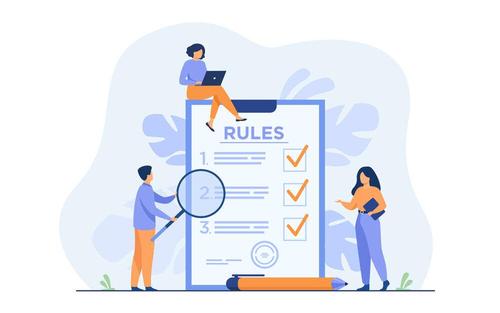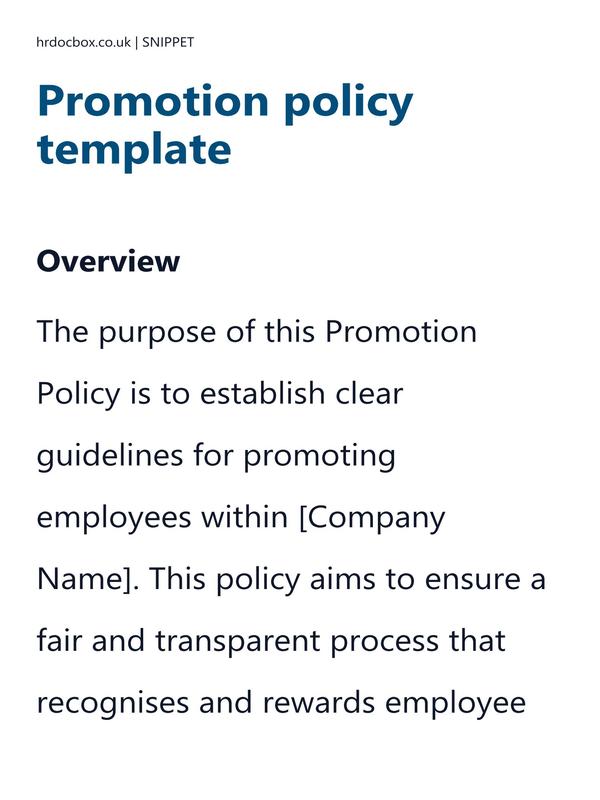Promotion policy template


Our promotion policy ensures clear criteria and fair processes for career advancement, enhancing employee motivation and retention.
- Includes 12 months' access to the Promotion policy template, with all updates provided free of charge and notified to you.
- UK-specific accuracy.
- 493 words over 2 pages.
- Last updated 07/07/2024.
- Format: Word / plain text / email.
- Delivery: Instant download after purchase (no physical item).
- Access: Download link shown here after checkout.
- This Promotion policy template will SAVE you up to 1 hour 30 mins drafting & research, save you money, and reduce your risk.
Promotion policy
1 Overview
1.1 The purpose of this Promotion Policy is to establish clear guidelines for promoting employees within [Company Name]. This policy aims to ensure a fair and transparent process that recognises and rewards employee performance, fosters career growth, and supports the company's strategic objectives.
2 Scope
2.1 This policy applies to all permanent employees of [Company Name].
3 General Principles
3.1 Policy Statement
3.1.1 [Company Name] is committed to promoting qualified employees from within the organization whenever possible. Promotions are based on merit, qualifications, and the needs of the company.
3.2 Eligibility
3.2.1 To be eligible for promotion, an employee must:
-
Have completed a minimum of [X] months/years of service in their current role.
-
Meet the qualifications and experience requirements for the new position.
-
Have a satisfactory performance record with no disciplinary actions in the past [X] months/years.
-
Demonstrate the potential and readiness for increased responsibilities.
3.3 Promotion Criteria
Promotions will be based
This is a 30% preview of the Promotion policy template. For instant full access, purchase this item or a parent bundle.
Promotion policy template purpose
A promotion policy outlines the criteria and procedures for advancing employees to higher positions within an organisation.
It ensures a transparent, fair, and consistent approach to recognising and rewarding talent, promoting merit-based progression.
This policy helps maintain employee motivation and engagement by providing clear career development pathways. It also supports organisational growth by aligning promotions with business needs and employee performance, fostering a culture of excellence and retention.
Practical application of a Promotion policy template
- Issue the Promotion policy template during onboarding / after changes / planned refresher.
- Send it to appropriate internal recipients such as employees, workers, contractors etc. and request confirmation that is has been read and understood.
Compliance
Compliance
This Promotion policy template incorporates relevant UK laws and HR standards, including those listed below:
-
Equality Act 2010: Ensures that promotion decisions are free from discrimination based on protected characteristics such as age, gender, race, disability, and more.
-
Employment Rights Act 1996: Provides a framework for fair treatment and procedural fairness in employment practices, including promotions.
-
Acas Code of Practice on Recruitment and Selection: Offers guidance on maintaining fairness, transparency, and consistency in the promotion process.
-
Best Practice: Objective Criteria and Transparency: Ensure that promotion policies use clear, objective criteria for evaluating candidates and that the process is transparent and well-communicated to all employees.
Frequently Asked Questions about a Promotion policy template
Frequently Asked Questions about a Promotion policy template
-
Can I use the Promotion policy template in my small business?
Yes. The Promotion policy template is designed to be flexible and suitable for organisations of all sizes, including small businesses and charities. It follows UK employment law best practice, so even if you don't have an in-house HR team, you can confidently apply it.
-
Is the Promotion policy template compliant with 2026 UK employment law?
Absolutely. Like the Promotion policy template, all of our templates are drafted with the latest ACAS guidance and UK employment legislation in mind. We review and update them regularly, so you can be confident they remain compliant.
-
Can I customise the Promotion policy template for my organisation?
Yes, we highlight the areas of the Promotion policy template that you need to update with your own details, and where you need to make decisions to suit your situation. This saves you time and ensures that you meet best practice.
-
Do I get instant access to the Promotion policy template?
Yes. Once purchased, you'll be able to download the Promotion policy template instantly. Templates are provided in editable Word or Excel format so you can customise them easily, and in PDF format for easy sharing.
-
What if I need more help, not just a Promotion policy template?
If you're looking for broader support, we also offer toolkits and library bundles that include the Promotion policy template, along with other HR templates and policies for fully managing your situation. These may be more cost-effective if you need deeper advice.
-
Why should I use this Promotion policy template, and not AI to generate it?
The risk of using a free AI-generated template 'without review' includes your legal exposure, missing context, and no awareness of the wider process, whereas purchasing the Promotion policy template from us mitigates that risk.
